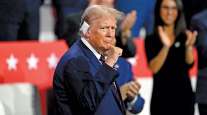Commerce Secretary Wilbur Ross Says It’s a ‘Little Premature’ to Discuss US WTO Exit

Commerce Secretary Wilbur Ross said it’s a “little premature” to discuss the U.S. withdrawing from the World Trade Organization as the Trump administration continues to look at ways to improve the global trade body.
The “WTO knows some reforms are needed. So I think there really is a need to update and synchronize its activities and we’ll see where that leads,” Ross said in an interview with CNBC on July 2. “But I think it’s a little premature to talk about simply withdrawing from it.”
Axios reported July 1 that the White House has drafted a bill that would allow President Donald Trump to ignore fundamental WTO rules and let him adjust tariff rates for different countries. It linked to a draft of the bill on its website. Trump on June 29 said he wasn’t planning to exit the WTO after an earlier report by Axios that the president has told senior aides repeatedly that he wants the U.S. to leave the Geneva-based organization.
RELATED: Fed economists say tariffs more likely to kill than create jobs
The U.S. already has thrown the WTO into turmoil by blocking the appointment of legal experts to the group’s appeals body, the world’s top court for settling trade disputes among nations. The Trump administration has railed against the WTO, complaining it interferes with sovereign trade matters and saying that China has failed to open up its economy as promised when it joined the WTO in 2001.
“We’ve made no secret of our view that there are some reforms needed at the WTO,” said Ross.
The Commerce Department is collecting public feedback for its investigation into whether to place restrictions on auto imports over national security, said Ross. Commerce will start preparing its recommendations for Trump after written comments from the public, which are due on July 6, and public hearings that are scheduled for July 19-20 in Washington.
The U.S.’ traditional trading partners and America’s top automakers have warned that imposing tariffs of as much as 25% could upend supply chains and cost jobs. The auto-import investigation, announced by the Trump administration in late May, was seen in part aimed at prodding Mexico and Canada into agreeing to the U.S. demands over renegotiating the North American Free Trade Agreement.
RELATED: Mack Trucks - Trump’s tariffs could put us at a competitive disadvantage
Detroit-based General Motors Co. said June 29 that imposing tariffs on imported vehicles and auto parts could lead the company to cut jobs and shrink its presence in its domestic market. Munich-based BMW AG has also warned about the damaging impact of tariffs.
The European Union sent a memo to the Commerce Department last week, saying that the U.S. investigation “lacks legitimacy, factual basis and violates international trade rules” and imposing restrictive measures could negatively impact gross domestic product in the states by as much as $14 billion.
RELATED: IMF spots trouble for global economy after 2020
Commerce has 270 days to hand over its report to the president under Section 232 security probes, like the one for steel and aluminum imports and now autos. Trump told reporters aboard Air Force One on June 29 that he expected the Commerce Department to complete the investigation “in three or four weeks.”
On steel and aluminum tariffs, Ross said that Commerce was inundated with requests for product exclusions by companies “gaming the system” by applying for as many exemptions as possible. Commerce is now processing the requests more quickly than they’re coming in so the backlog should clear up shortly, said Ross.
The tariffs took effect for most nations in late March.
Steel and aluminum imports for Canada, the EU and Mexico were added last month, after they failed to reach a deal to secure permanent exemptions and have all since retaliated with billions of dollars of tariffs on U.S. goods, sending ties between the Trump administration and some of America’s major trade partners to new lows.




